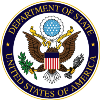Confronting Human Traffickers, Helping Those Who Are Victimized
By: John A. Freeman, Supervisory Special Agent in the Bureau of Diplomatic Security at the U.S. Department of State.
“It’s in our strategic interest as well to ensure that this fight is a priority of our foreign policy… So we all have an interest in succeeding, in winning this battle and in making sure that the perpetrators of these crimes are brought to justice.” – U.S. Secretary of State John Kerry at the October 24, 2016, Annual Meeting of the President’s Interagency Task Force to Monitor and Combat Trafficking in Persons.
#EndTrafficking isn’t just a hashtag – it’s the very real objective behind National Human Trafficking Prevention Month.
While human trafficking is commonly associated with sex trafficking of adults and children in brothels, it can just as easily be found hiding in plain sight among coerced and abused workers on farms and in factories. Even the mansions of the affluent can be the scene of human trafficking when domestic workers are forced to work excessive hours with little or no pay. For the Department of State and the Diplomatic Security Service (DSS), the goal to #EndTrafficking is yet another way to serve both the United States and humanity at large.
Worldwide Vulnerability
While many believe slavery ended generations ago, the global demand for cheap labor, combined with exploitation of vulnerable individuals or communities, often add to the scourge of human trafficking. Even well-intentioned consumers of goods can inadvertently purchase items made by forced labor. By better identifying how traffickers use force, fraud, or coercion to trap their victims, we might have a better grasp on how to prevent this crime from happening in the first place.
How does the Diplomatic Security Service fit in?
DSS special agents work in 275 U.S. embassies and consulates in 170 foreign countries, and we are frequently at the epicenter of multi-national investigations, including those involving human trafficking. DSS agents are well versed in the intricacies of both passport and visa fraud, an element frequently tied to other criminal schemes, such as human trafficking, drug trafficking, money laundering, extortion, and smuggling. In a growing number of instances, foreign law enforcement agencies seek DSS assistance in their own efforts to combat human trafficking. In addition, DSS agents and analysts from domestic offices across the United States are joining with other federal, state, tribal, and local officials to increase efforts to both identify and investigate trafficking.
Program History
DSS’s first human trafficking case took place in 2004, resulting in a successful prosecution. Among the more complex international trafficking cases DSS has investigated was a sex trafficking case in 2012 when DSS agents assigned to the U.S. Embassy in Canberra, Australia, interviewed a possible sex trafficking victim. The agents then coordinated the case details with the DSS Miami Field Office. The Miami Field Office had been working on an interagency human trafficking task force since 2011 and connected the new information to an ongoing investigation of a commercial sex trafficker in Florida. The investigation resulted in a successful conviction and a 27-year federal prison sentence.
Internal and External Training
Over the last five years, DSS’s human trafficking effort has expanded. It now includes an online trafficking awareness course that trains more DSS personnel worldwide to spot trafficking. DSS also has built stronger partnerships with others bureaus at State, Department of Justice, and the Department of Homeland Security. Working together, DSS helped deliver specialized training to 2,300 U.S. government employees at 10 embassies and consulates, and 800 employees at U.S. passport agencies and DSS field and resident offices. These training projects will continue in the years to come.
Victims’ Assistance
A crucial part of the DSS human trafficking effort is ensuring victims receive support and assistance. DSS is able to provide help through the DSS Victims’ Resource Advocacy Program (VRAP). When providing support to victims, such as safe housing or medical care, VRAP tailors its assistance to meet the needs of individuals and their circumstances. That support may allow victims to more effectively testify against their trafficker. DSS’s global presence and subsequent cultural sensitivity make DSS uniquely suited to build a victim-centric investigation, leading to more arrests and prosecutions.
Moving Forward
DSS agents and analysts are currently hard at work on multiple human trafficking cases, both independently and with partners in the United States and abroad. Some investigations result in federal indictments, jail terms, and stiff financial penalties. In other cases, victims are removed from the trafficking situation and primarily want assistance getting home to their families. By expanding this investigative effort, DSS is not only fighting the global crime of human trafficking, but joining other Department offices to represent the United States in shaping and sustaining a peaceful, prosperous, just, and democratic world.
